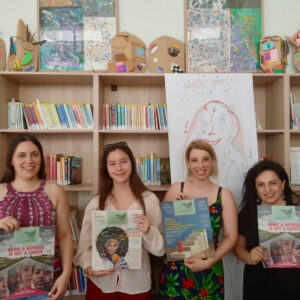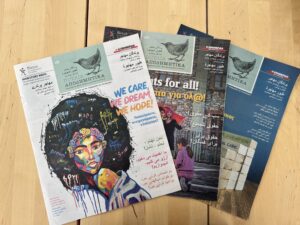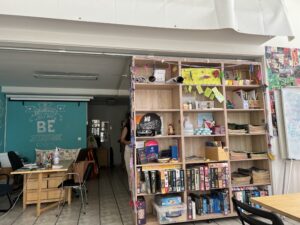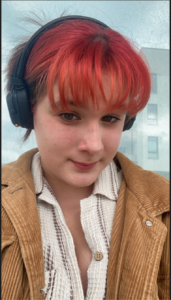A Greek newspaper is “empowering” refugees to ‘fly high’ by introducing them to journalism and giving them a voice.

Sofiya Suleimenova and OXSFJ tutor Tatev Hovhannisyan visit Xenia Barka and Alexia Karapatsia at Migratory Birds in Athens, Greece.
August 4, 2023
Greek newspaper Migratory Birds helps refugee teenagers ‘fly high’
Migratory Birds shares the stories of those under-represented in Greece and across the world – refugees and the youth.
Migratory Birds, which is also the name of the organisation’s other media projects, enables young people to develop new skills, expand their knowledge and build a new community. It has enabled refugees to achieve against stacked odds and offers them the opportunity of a brighter future.
Xenia Barka, Media Trainer-Editor of “Young Journalists”/Migratory Birds, and Alexia Karapatsia, Program & HR Manager of Network for Children’s Rights in Athens – where the newspaper operates – shared with me upon my visit the story behind the program and the magazine launch and growth.
The “Young Journalists” program started as a pilot project by the Network for Children’s Rights during the European refugee crisis (2015-2016) in the Schisto camp outside of Athens, Greece. It was the initiative of 15 Afghan teenage girls and one Greek girl, who decided it was time for the refugee population to be truly heard.
The project’s aim is to introduce young refugees to the principles of journalism and media while helping them to integrate into the Greek community. It focuses not only on printed issues but also on introducing other media-related branches, such as podcasts – Radio Dandelion – aided by the help of professionals.
“It's a place open and free, safe for young people, refugees, immigrants”, said Karapatsia.
The only requirement is for participants to be between 14 and 24 years old. Over the last years, they managed to work with over 200 teenagers “with the dual purpose to integrate refugees and immigrants and to combat xenophobia.”
Migratory Birds
The causes and consequences of climate change are unequally distributed. How this mechanism drives crises and how more justice could be created.
Since March 2023, 50 young people actively participate in various workshops and 15-20 take part in editorials.
One of the project’s main focuses is the newspaper Migratory Birds, which is produced by young refugees, immigrants and Greeks.
The issues produced by them in five languages (English, Greek, Farsi, Arabic and Urdu) are published by the newspaper EfSyn.
All copies distributed across Greece, including schools and refugee camps, are free.
Like any newspaper, Migratory Birds holds weekly editorials. But extra individual meetings take place at the Youth Centre or online throughout the week. Some members that later moved to other countries still keep in contact and participate remotely in activities.
The topics of the newspaper vary from the refugees’ journeys to their interests in art, sports, and culture, among others.
The activities are expanded to those outside of the classroom. Organisers take the young people to exhibitions, festivals and to conduct interviews. Examples include interviews of the representative of the United Nations High Commissioner for Refugees (UNHCR), the US ambassador, the president of the Roma community in Greece and a specialist in human trafficking from the US.
“We are trying to have a holistic approach on how to be involved in journalism”, pointed out Karapatsia.
A project enabling young people “to move forward with their lives.”
As highlighted by Barka, some of the refugees do not have a high level of education due to conditions in their home country or other difficulties. So, writing can come as a challenge for both the participants and supervisors. But, the supervisors understand that it is “more important to make them write something even though they don’t know the right grammar.”
“We are telling them that the most important thing is to express their thoughts”, said Barka. For this reason, the organisers develop other ways in which young people can express themselves more easily, such as verbally and artistically.
“We have to make sure that they feel comfortable enough to work with us”, added Karapatsia.
Even though some may not want to pursue journalism in the future, Migratory Birds enables the young participants to develop new skills, expand their knowledge and socialise.
Working with other young people gives them a chance to make friends and the opportunities to meet experts give them a possibility to apply for scholarships, internships, and jobs.
Karapatsia shared that the least that this project aims to give to the youth is “the skills and the ability to move forward with their lives.”
The realisation of these goals can be seen in the 3 month paid internships three young members acquired as part of the UNHCR funded project. Two of the members worked at production companies, and one as a photographer.
When asked about a success story of the members of Migratory Birds, I was told of a male teenager’s journey from Guinea, who had turned his life around through the newspaper project.
The teenager had initially read Migratory Birds at a Greek camp he was living in and was captured by the stories presented in that edition. Once he managed to come to Athens, he was brought to the Youth Center, where the newspaper is run and was left amazed by the coincidence and could not help but join the team. During his time at the newspaper (spanning a year and a half), he managed to meet the mayor of Athens and attend the Athens Democracy Forum. Now, he is 18 years old and has applied for a college scholarship.
If you wish to support Migratory Birds, here is the link: https://migratorybirds.gr/support-us/





